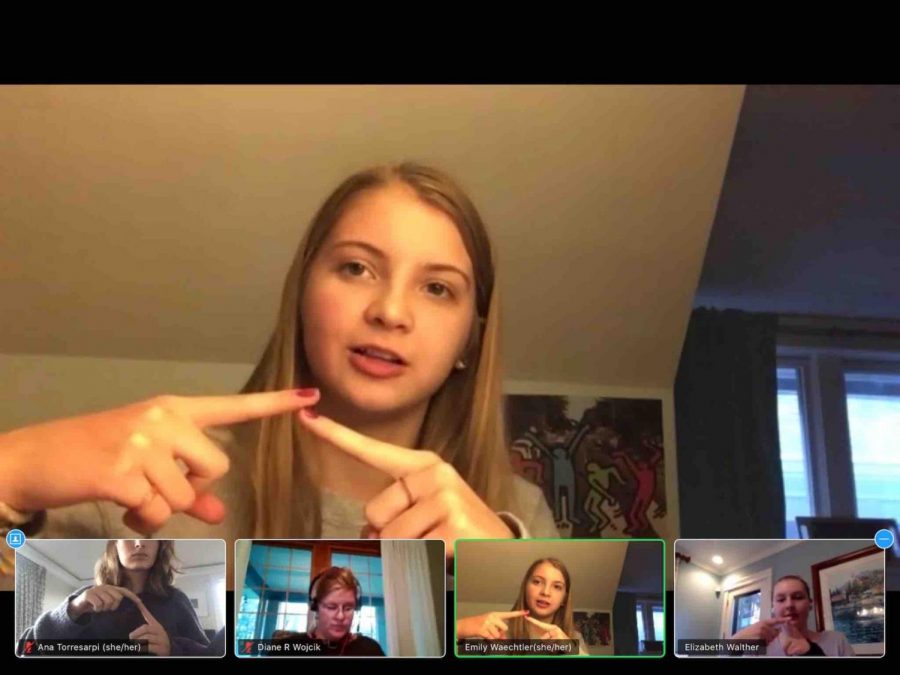Club sponsors scramble to adjust to their new remote environment
While some clubs have struggled to stay afloat, others have seen a sudden increase in new members
Torresarpi
Emily Waechtler demonstrates the sign for “where” during a recent meeting of the Sign Language Club
For the first time in school history, the annual club fair was held over Zoom on Sept. 23. As students entered the virtual event, it became clear that this situation would bring unique opportunities for both students and sponsors.
Since the fair was online, it was more accessible for some students to attend. This led to a larger concentration of students joining and looking at clubs.
“When we did the club activities fair, we had over 60 people come and check out our club, which surprised all of us,” said Diane Wojcik, a sponsor of the Sign Language (ASL) club.
The circumstances around remote learning have given an unexpected opportunity for smaller clubs to gain new members. The ASL club went from an average of 20 students attending to around 30 students joining their first meeting.
“To have the drastic jump of interest, I have to think that COVID impacted that, somewhat,” says Wojcik.
While smaller clubs are benefitting from the new situation, larger clubs that demand a physical presence in the classroom have seen an opposite trend. Activities like the archery club have been temporarily suspended for the time being. There is also a current ban on creating new clubs.
However, the suspension does not include any competitive clubs. The robotics club has begun to meet on Tuesdays and Thursdays, and members have the option to meet in small groups on the Winnetka campus. For convenience, most students choose to stay home rather than commute.
Some students feel like this arrangement has diminished their club experience. Emi Dobek, a sophomore in both the Robotics Club and Science Olympiad, said meeting and learning remotely has been a struggle.
“When you’re in person, you’re able to communicate more easily with sponsors… it’s like a totally different feeling, instead of being in your Zoom. There’s no connection.”
Along with limited in-person groups, traveling for competitions has been cancelled for all clubs. The decision has disappointed many, including Dobek, since Science Olympiad competitions will be held online.
“The whole aspect of robotics club is that you’re in a team environment, so if you’re not in that environment, you don’t form those connections, or bonds, with your group members as before,” she said. “The whole competition is just minimized.”
When the school is in hybrid learning, there will be opportunities for most clubs to transition into in-person clubs. For some, like the ASL club, meeting in person would cause more of a challenge, since sign language relies on facial expressions, and masks would defeat the purpose.
For other clubs, like the chess club, remote learning has no major consequences, so meeting in real life isn’t a priority. In fact, on Oct. 23, the club had a Tournament hosted completely online.
This remote set-up provided a new opportunity for the tournament.
“We can actually watch all the games online. We could watch a game, and [the players] can’t hear us if we choose to talk about it. Whereas, when we’re in a normal, physical environment, we can watch, but have to be quiet during the match,” said business teacher Matthew Mersch, sponsor of the chess club.
One thing Mersch is worried about is the possibility of cheating. Just like any other classroom, being online gives students the ability to look up answers if they want to.
“The kids can cheat online. We haven’t had a problem yet, but I am worried if we get to a conference or state tournament if cheating is going to be a problem,” said Mersch.
Even if some clubs are struggling to stay on screens, at the very least attendees can still meet and connect with their peers. Although meeting online doesn’t amount to in-person, many say that it’s still worth going and enjoying what they have.
“It’s still worth going for the future. While competitions right now are not as engaging or interesting, the hope is that we will start to see more competitions in person and more competitions that look like competitions in prior years,” said Dobek. “I still get to enjoy being there, regardless.”







































